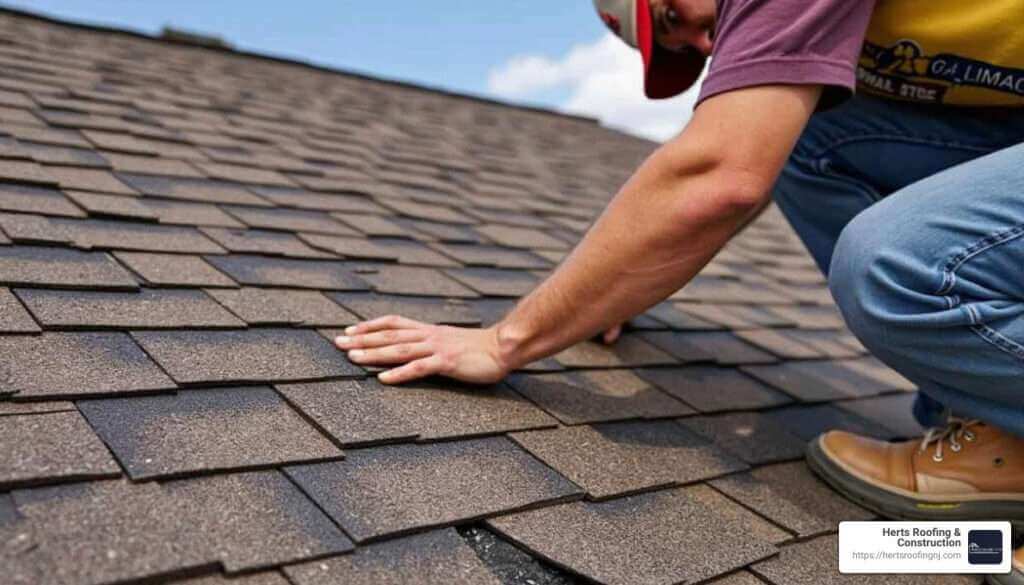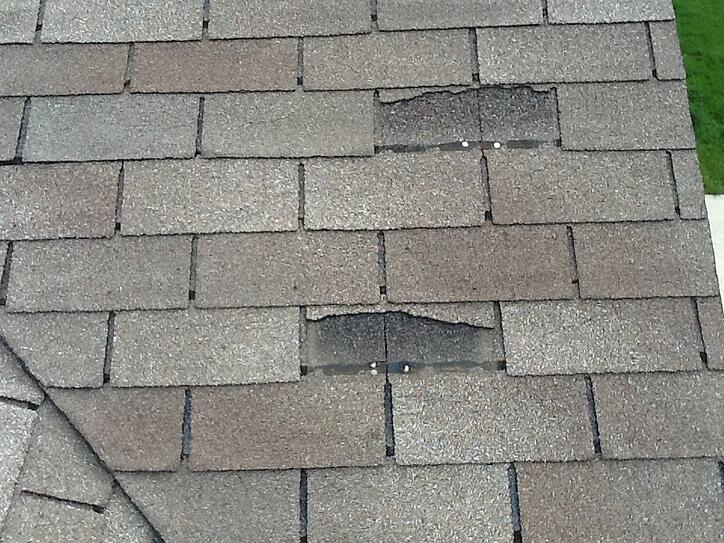How Often Should You Replace Your Roof?
As a New Jersey homeowner, I’ve faced my fair share of roofing challenges. From harsh winters to scorching summers, our roofs take a beating year-round. But how do you know when it’s time to replace your roof rather than just patch it up?
I remember the day I noticed a small water stain on my living room ceiling. At first, I brushed it off as a minor issue. But as the stain grew and more problems surfaced, I realized I was facing a bigger problem than I’d initially thought. That’s when I embarked on a journey to understand the signs of roof damage, the impact of age on roofing materials, and the unique roofing challenges we face here in the Garden State.
In this blog post, I’ll share my personal experiences and the knowledge I’ve gained along the way. We’ll explore the telltale signs of roof damage, discuss age-related factors that affect your roof’s lifespan, and delve into the benefits of professional inspections. I’ll also guide you through some DIY assessment techniques and help you understand when repairs just aren’t enough. By the end, you’ll have a clear idea of whether you need a roof replacement and how to choose the right roofing material for your New Jersey home. Let’s dive in and uncover the secrets to maintaining a sturdy roof over your head!
Signs of Roof Damage
As a seasoned roofing expert in New Jersey, I’ve seen my fair share of roof damage. Recognizing these signs early can save you from costly repairs down the line. Let’s dive into the key indicators that your roof might need replacement.
A. Visible Shingle Deterioration
When I inspect roofs, one of the first things I look for is visible shingle damage. Curling, cracking, or missing shingles are clear red flags. I’ve noticed that in New Jersey’s climate, shingles can deteriorate faster due to our harsh winters and hot summers.
B. Daylight Through Roof Boards
During my attic inspections, I always check for any light peeking through the roof boards. If I can see daylight, it’s a sure sign that your roof has gaps or holes that need immediate attention.
C. Granules in Gutters
I always make it a point to check the gutters. Finding an excessive amount of granules (they look like coarse sand) in your gutters is a telltale sign of advanced shingle wear.
D. Sagging Roof Deck
A sagging roof deck is one of the most serious issues I encounter. It often indicates structural damage and requires immediate action to prevent potential collapse.
E. Water Stains on Ceilings or Walls
Inside the house, I keep an eye out for water stains on ceilings or walls. These are often signs of a leaking roof, which can lead to mold growth and structural damage if left unchecked.
Here’s a quick reference table of these signs and their severity:
| Sign of Damage | Severity | Immediate Action Needed |
|---|---|---|
| Shingle Deterioration | Moderate | Inspection |
| Daylight Through Roof | High | Repair/Replace |
| Granules in Gutters | Moderate | Inspection |
| Sagging Roof Deck | Very High | Immediate Replacement |
| Water Stains | High | Leak Detection & Repair |
Remember, these signs often indicate that your roof is nearing the end of its lifespan. In my experience, it’s crucial to address these issues promptly to protect your home. Next, we’ll explore how the age of your roof plays a role in determining if it’s time for a replacement.
Age-Related Factors
How Often Should You Replace Your Roof? As a roofing expert in New Jersey, I’ve seen my fair share of aging roofs. Let me walk you through the key age-related factors that might indicate it’s time for a roof replacement.
Signs of an aging roof
When I inspect roofs, I look for these telltale signs of aging:
- Curling or missing shingles
- Granules in the gutters
- Sagging roof deck
- Daylight visible through roof boards
- Dark streaks or algae growth
These issues often become more prevalent as a roof ages, and I’ve noticed they can accelerate quickly if left unaddressed.
Impact of New Jersey weather on roof longevity
New Jersey’s climate can be tough on roofs. Here’s how our weather affects roof lifespan:
| Weather Condition | Impact on Roof |
|---|---|
| Heavy snow | Adds weight stress |
| Freeze-thaw cycles | Causes expansion and contraction |
| Strong winds | Can lift and damage shingles |
| Intense summer heat | Accelerates material breakdown |
| Coastal salt air | Corrodes metal components |
I’ve seen these weather factors significantly reduce the expected lifespan of roofs in our area.
Typical lifespan of different roofing materials
Based on my experience in New Jersey, here’s the average lifespan you can expect from different roofing materials:
- Asphalt shingles: 20-30 years
- Wood shakes: 30-40 years
- Metal roofing: 40-70 years
- Slate tiles: 50-100+ years
- Clay/concrete tiles: 50-100+ years
Remember, these are just averages. The actual lifespan can vary depending on the quality of installation, maintenance, and local weather conditions. In my professional opinion, if your roof is approaching these age ranges, it’s wise to start considering a replacement, especially if you’re noticing any of the signs we discussed earlier.
Now that we’ve covered age-related factors, let’s move on to the importance of professional roof inspections in determining if you need a replacement.
Professional Roof Inspection

When it comes to determining whether I need a roof replacement in New Jersey, I’ve found that a professional roof inspection is invaluable. Let me share my insights on this crucial step in the decision-making process.
Frequency of inspections
I make it a point to schedule regular roof inspections, typically:
- Once a year for general maintenance
- After severe weather events (e.g., hurricanes, heavy snowstorms)
- When I notice any visible signs of damage
Here’s a quick breakdown of my inspection schedule:
| Inspection Type | Frequency | Reason |
|---|---|---|
| Routine | Annual | Preventive maintenance |
| Post-weather | As needed | Assess storm damage |
| Concern-based | When issues arise | Address specific problems |
What inspectors look for
During a professional inspection, I’ve observed that experts thoroughly examine various aspects of my roof:
- Shingle condition (curling, missing, or damaged shingles)
- Flashing around chimneys and vents
- Gutter system integrity
- Signs of water damage or leaks in the attic
- Structural issues like sagging or uneven roof planes
Benefits of expert assessment
I’ve found numerous advantages to having a professional inspect my roof:
- Accurate diagnosis of roof problems
- Early detection of potential issues
- Expert recommendations for repairs or replacement
- Documentation for insurance claims
- Peace of mind knowing the true condition of my roof
By relying on professional inspections, I ensure that I’m making informed decisions about my roof’s maintenance and potential replacement needs. This proactive approach helps me avoid costly surprises and maintain the integrity of my home in New Jersey’s challenging climate. Now that I understand the importance of professional assessments, let’s explore the cost considerations involved in roof replacement.
Cost Considerations
When it comes to roof replacement in New Jersey, I always advise homeowners to consider the financial aspects carefully. Let’s dive into the cost considerations that can help you make an informed decision.
Long-term savings of timely replacement
I’ve seen firsthand how a timely roof replacement can lead to significant long-term savings. By addressing issues early, you can avoid more extensive damage that could cost you much more in the future. Here’s a quick breakdown of potential savings:
| Timely Replacement | Delayed Replacement |
|---|---|
| Lower repair costs | Higher repair costs |
| Minimal structural damage | Potential extensive damage |
| Energy efficiency savings | Increased energy bills |
| Maintained property value | Decreased property value |
Energy efficiency improvements
One of the most exciting aspects of a roof replacement is the opportunity to improve your home’s energy efficiency. I often recommend:
- Installing reflective roofing materials
- Adding proper insulation
- Improving ventilation
These upgrades can lead to lower energy bills and a more comfortable living environment.
Insurance coverage possibilities
I always encourage homeowners to check their insurance policies. In some cases, roof replacement might be partially or fully covered, especially if the damage is due to a sudden event like a storm. It’s worth exploring this option to potentially offset some of the costs.
Repair vs. replacement expenses
When I assess a roof, I consider whether repairs or a full replacement is more cost-effective. Here’s what I typically look at:
- Extent of damage
- Age of the roof
- Cost of repairs vs. replacement
- Long-term durability of repairs
In many cases, if a roof is nearing the end of its lifespan, I find that replacement often proves more economical than repeated repairs.
Now that we’ve covered the financial aspects, let’s look at some specific roofing concerns unique to New Jersey that you should be aware of.
New Jersey-Specific Roofing Concerns
As a seasoned roofing expert in New Jersey, I’ve encountered numerous challenges unique to our state. Let me share some insights on the specific roofing concerns we face here in the Garden State.
A. Regional building codes and regulations
In New Jersey, we have strict building codes and regulations that homeowners must adhere to when considering a roof replacement. Here’s a quick overview:
- Local permits are required for most roof replacements
- Energy efficiency standards must be met
- Specific fire-resistant materials may be mandated in certain areas
It’s crucial to work with a contractor who’s well-versed in these regulations to ensure compliance.
B. Common roofing materials in the area
Based on my experience, here are the most popular roofing materials in New Jersey:
| Material | Pros | Cons |
|---|---|---|
| Asphalt shingles | Affordable, versatile | Shorter lifespan |
| Metal roofing | Durable, energy-efficient | Higher upfront cost |
| Slate | Long-lasting, aesthetically pleasing | Heavy, expensive |
| Cedar shakes | Natural look, good insulation | Requires more maintenance |
C. Local climate challenges
New Jersey’s climate presents unique challenges for roofs:
- Harsh winters with heavy snow and ice
- Hot, humid summers that can lead to moisture issues
- Frequent coastal storms and occasional hurricanes
- Rapid temperature fluctuations causing expansion and contraction
To combat these challenges, I always recommend:
- Proper attic ventilation to prevent ice dams
- Regular gutter maintenance to ensure proper drainage
- Impact-resistant materials in areas prone to hail
- Adequate insulation to combat temperature extremes
With these New Jersey-specific concerns in mind, let’s explore how to choose the right time for your roof replacement.
Choosing the Right Time for Replacement
When it comes to replacing your roof in New Jersey, timing is everything. I’ve learned that planning ahead can save you a lot of headaches and even some money. Let’s dive into how you can choose the best time for your roof replacement.
Planning for minimal disruption
How Often Should You Replace Your Roof? I always advise homeowners to plan their roof replacement to minimize disruption to their daily lives. Here’s a quick list of factors I consider:
- Family schedules (school, work, vacations)
- Upcoming events or gatherings at home
- Noise sensitivity of household members or neighbors
Urgency assessment
Assessing the urgency of your roof replacement is crucial. I use this table to help homeowners understand their situation:
| Urgency Level | Signs | Recommended Action |
|---|---|---|
| Low | Minor wear, no leaks | Plan within 6-12 months |
| Medium | Some visible damage, small leaks | Schedule within 3-6 months |
| High | Significant damage, active leaks | Replace as soon as possible |
Seasonal considerations
In New Jersey, the seasons play a significant role in roof replacement timing. Here’s what I’ve learned about each season:
- Spring: Ideal for most replacements, but can be rainy
- Summer: Excellent weather, but potentially higher costs due to demand
- Fall: Perfect temperature, but contractors may be busy
- Winter: Possible in NJ, but cold temperatures can affect material installation
Now that we’ve covered the timing aspects, it’s important to consider who will be doing the work. Let’s move on to selecting a reliable roofing contractor who can handle your New Jersey home’s specific needs.
Selecting a Reliable Roofing Contractor

Now that you’ve determined it’s time for a roof replacement, the next crucial step is finding the right contractor for the job. As someone who’s been in the roofing industry for years, I can’t stress enough how important this decision is. Let me guide you through the process of selecting a reliable roofing contractor in New Jersey.
Checking for Local Experience
When it comes to roofing in New Jersey, local experience matters. I always recommend looking for contractors who have:
- At least 5 years of experience in the area
- Knowledge of local building codes and regulations
- Familiarity with New Jersey’s unique climate challenges
Comparing Quotes and Warranties
Don’t just settle for the first quote you receive. I suggest getting at least three quotes from different contractors. Here’s a quick comparison table to help you evaluate:
| Factor | Contractor A | Contractor B | Contractor C |
|---|---|---|---|
| Price | |||
| Warranty Length | |||
| Materials Used | |||
| Timeline |
Remember, the cheapest option isn’t always the best. Look for a balance between price, quality, and warranty coverage.
Reading Customer Reviews and Testimonials
In my experience, nothing speaks louder than the experiences of past customers. Here’s how I recommend vetting contractors through reviews:
- Check online platforms like Google, Yelp, and BBB
- Look for detailed reviews that mention specific aspects of the job
- Pay attention to how the contractor responds to negative reviews
- Ask for references and actually call them
Licensing and Insurance Requirements
Lastly, but crucially, ensure your chosen contractor meets all legal requirements. In New Jersey, roofing contractors must:
- Be registered with the New Jersey Division of Consumer Affairs
- Carry general liability insurance (at least $500,000 coverage)
- Have workers’ compensation insurance for their employees
I always ask to see proof of these documents before signing any contract. It’s your right as a homeowner to verify this information.
By following these steps, you’ll be well on your way to finding a reliable roofing contractor who can deliver quality work on your New Jersey home. In the next section, we’ll discuss how to prepare for your roof replacement project.
Throughout this blog post, I’ve shared crucial insights on determining whether your New Jersey home needs a roof replacement. From identifying signs of damage to considering age-related factors, I’ve emphasized the importance of professional inspections and cost considerations. I’ve also highlighted specific roofing concerns unique to New Jersey’s climate and provided guidance on choosing the right time for replacement and selecting a reliable contractor.
Conclusion
As a homeowner in New Jersey, I can’t stress enough how vital it is to stay proactive about your roof’s condition. Regular inspections and timely replacements not only protect your home but can also save you money in the long run. If you’ve noticed any of the warning signs mentioned or if your roof is approaching the end of its lifespan, I urge you to consult with a reputable roofing professional. Don’t wait for a small issue to become a major problem – take action now to ensure your home remains safe, dry, and energy-efficient for years to come.




